It’s a constant struggle to win the hearts and minds of customers. It’s even more of a struggle to quantify the ROI it takes for your employees to do that.
Businesses are rightly concerned with the sale, closing the deal and moving onto the next. But it’s critical your business continues to show the customer the value of your product or service.
Successful customer relationships depend on truly growing, nurturing, putting in the time and effort, after that sale is closed.
Enter the customer success manager.
Customer Success Managers (CSM) support customers transition from sales prospects to active users. CSMs are laser-focused on loyalty, building long-term relationships.
That’s why we asked six Customer Success professionals the following question:
How Do You Justify the ROI of the CSM Role?
Their answers shed a lot of light on how to assign value to human elements within sales cycles and business in general.
Aditya Maheshwari | Director of Customer Success at AppsFlyer
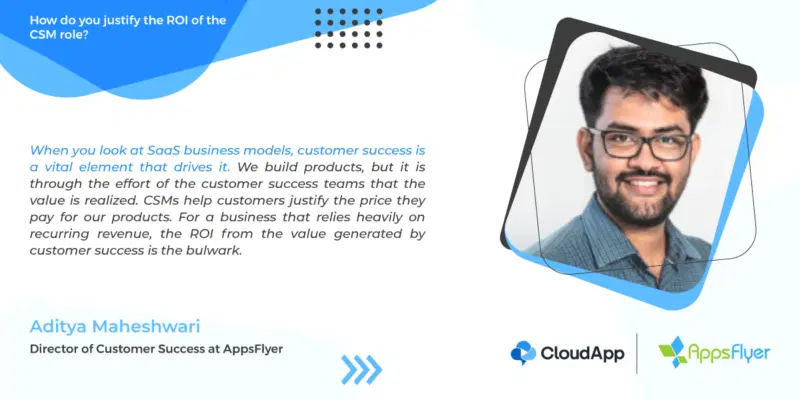
When you look at SaaS business models, customer success is a vital element that drives it. We build products, but it is through the effort of the customer success teams that the value is realized. CSMs help customers justify the price they pay for our products. For a business that relies heavily on recurring revenue, the ROI from the value generated by customer success is the bulwark.
Nate Brown | Senior Director of CX at Arise, Co-Founder of CX Accelerator
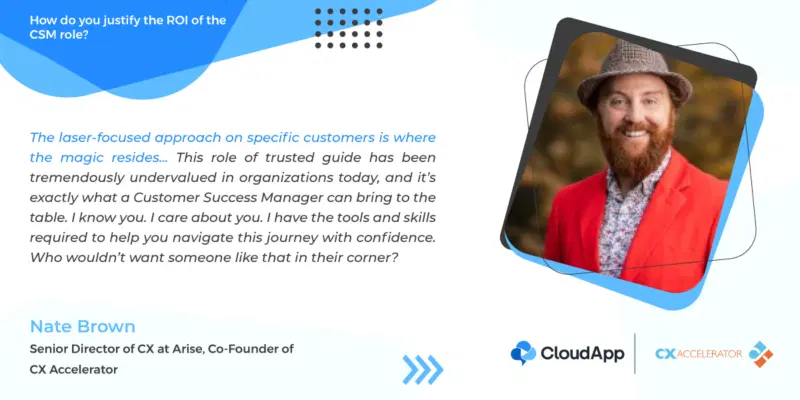
The Customer Success concept has come in fast and strong with a better way to work. While it was born in the SaaS world as an approach to obtain increased renewal rates, the Customer Success pioneers have proven themselves…and are now coming for B2B general industry.
The laser-focused approach on specific customers is where the magic resides. In Building a StoryBrand, author Donald Miller talks about the importance of understanding the customer’s definition of success and acting as a competent guide to get them there. This role of trusted guide has been tremendously undervalued in organizations today, and it’s exactly what a Customer Success Manager can bring to the table. I know you. I care about you. I have the tools and skills required to help you navigate this journey with confidence. Who wouldn’t want someone like that in their corner! It creates a far stickier customer relationship paving the way for enhanced loyalty and expansion possibilities.
Ellie Wu | VP of Customer Experience at Bugcrowd
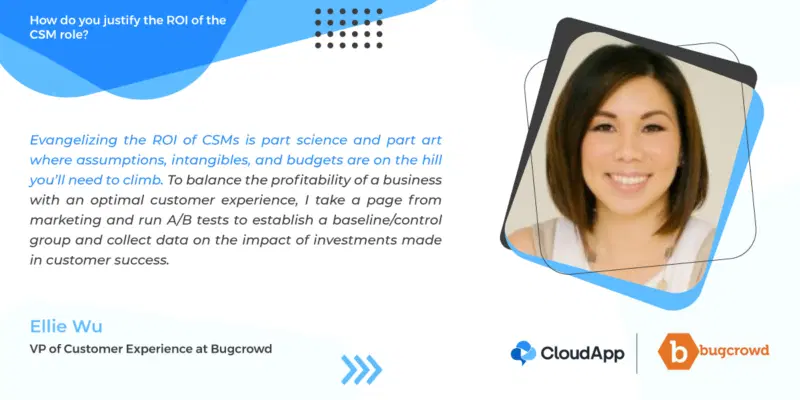
Evangelizing the ROI of CSMs is part science and part art where assumptions, intangibles, and budgets are on the hill you’ll need to climb. To balance the profitability of a business with an optimal customer experience, I take a page from Marketing and run A/B tests to establish a baseline/control group and collect data on the impact of investments made in Customer Success.
Kristie Faltorusso | VP of Customer Success at ClientSuccess
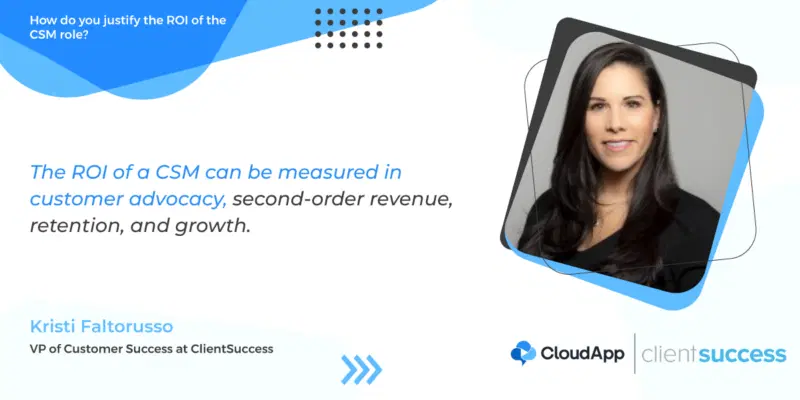
The ROI of a CSM can be measured in customer advocacy, second-order revenue, retention and growth.
Jeannie Walters | CEO & Chief Customer Experience Investigator at Experience Investigators
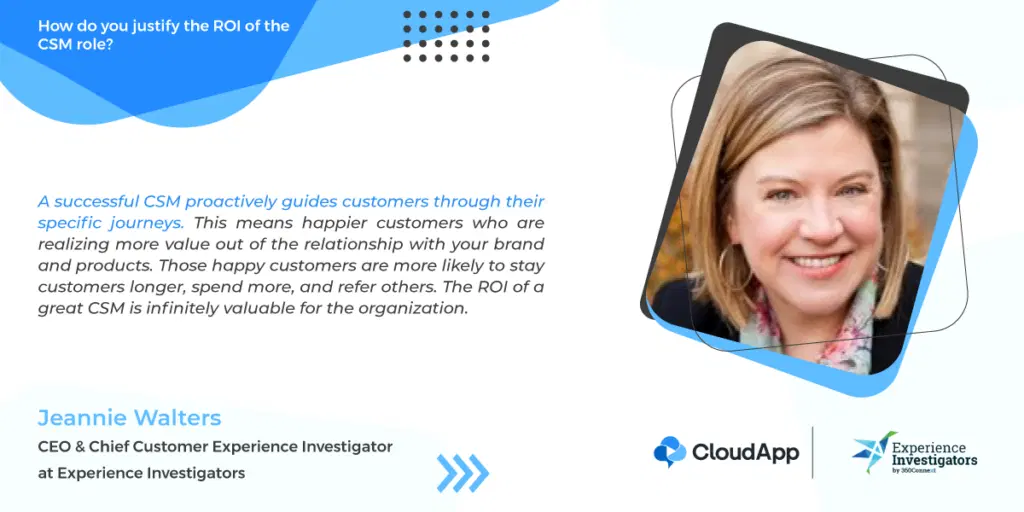
A successful CSM proactively guides customers through their specific journeys. This means happier customers who are realizing more value out of the relationship with your brand and products. Those happy customers are more likely to stay customers longer, spend more, and refer others. The ROI of a great CSM is infinitely valuable for the organization.
Tyler Sellhorn | Head of Customer Experience at Yac
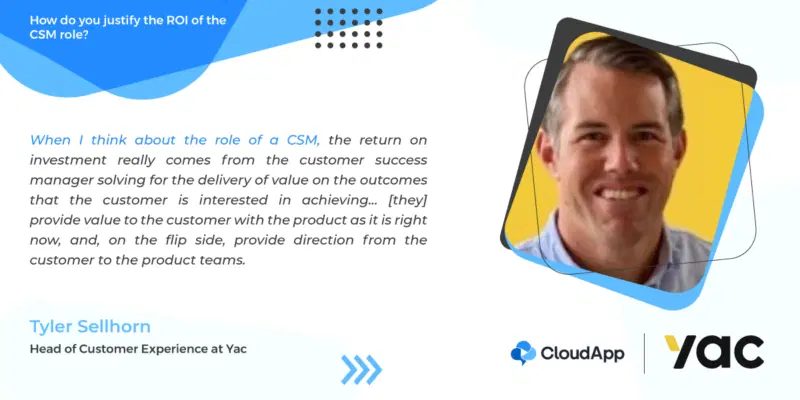
When I think about the role of a CSM, the return on investment really comes from the customer success manager solving for the delivery of value on the outcomes that the customer is interested in achieving. The product has been built in a particular way for specific use cases, and the customer may or may not be ideally suited for the product. So one of the things that customer success managers can do is provide a human layer on top of what already exists in the product.
That really helps connect the customer to what the product can actually do and for the product to adapt to the existing customer base as it is. The biggest thing that customers success managers can do is provide value to the customer with the product as it is right now, and, on the flip side, provide direction from the customer to the product teams to build for the customers that are getting value right now.
Would you like to be featured in one of Zight (formerly CloudApp)’s upcoming CS flipbooks?
We’re looking for more Customer Success and Support professionals to feature in our content! If you would like to participate as a panelist in one of our upcoming flipbooks, fill out our form and we’ll connect with you.












